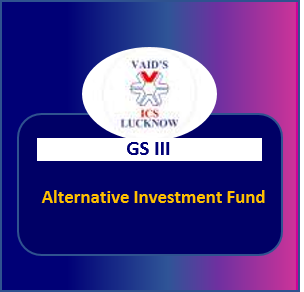CURRENT AFFAIRS
Get the most updated and recent current affair content on Padhaikaro.com
Alternative Investment Fund
- Vaid's ICS, Lucknow
- 24, Aug 2021

Why in News?
Finance minister has launched Rs 250 crore worth Alternative Investment Fund for export-oriented micro, small and medium enterprises (MSMEs).
Objective of the fund:
To Identify Indian enterprises with potential advantages by way of technology, products or processes along with export potential, but which are currently underperforming or unable to tap their latent potential to grow.
- The main purpose is to encourage MSMEs as they are vital to the economy in terms of creating jobs, fostering innovations and reviving the economy.
Type of fund:
Ubharte sitaare fund is a type of Alternative investment fund.
Key features of the scheme:
- The Fund has been set up by Exim Bank and SIDBI (Small Industries Development Bank of India).
- The fund is a mix of structured support, both financial and advisory services.
- It will also have a Greenshoe Option of Rs 250 crore.
- The Fund covers potential companies, across various sectors such as pharma, auto components, engineering solutions, agriculture, and software etc.
Significance of this programme:
- It identifies Indian companies that have the potential to be future champions in the domestic arena while catering to global demands.
- Enabling MSME to expand their ventures will drive the overall economy, as they make up for about 45 per cent of the country’s total manufacturing output, 40 percent of exports, and almost 30 per cent of the national GDP.
- This will also give a boost to sector specific growth like ‘ONE DISTRICT ONE PRODUCT’ in Uttar Pradesh.
What is an Alternative Investment Fund (AIF)?
- Alternative Investment Fund comprises pooled investment funds which invest in venture capital, private equity, hedge funds, managed futures etc.
- In simpler terms, an AIF refers to an investment which differs from conventional investment avenues such as stocks, debt securities, etc.
AIF does not include funds covered under the SEBI (Mutual Funds) Regulations, 1996, SEBI (Collective Investment Schemes) Regulations, 1999 or any other regulations of the Board to regulate fund management activities.
Nonetheless, the alternative investment funds have to register with SEBI.

What is a greenshoe option?
It is an over-allotment option. In the context of an initial public offering (IPO), it is a provision in an underwriting agreement that grants the underwriter the right to sell investors more shares than initially planned by the issuer if the demand for a security issue proves higher than expected.
Facts for Prelims:
Reverse Greenshoe Option
The definition of a reverse greenshoe option, also known as an overallotment option, is a provision used by underwriters in the initial public offering (IPO) process.
It is intended to provide increased price stability for the newly-listed security.